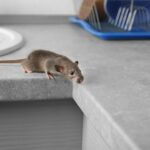Many of us are turning to natural pest deterrents to drive rats away. While rats have poor vision, they have a good sense of smell. Rats can pick up various scents, including smells humans can’t detect.
However, if the smell of a deterrent begins to dissipate, rats will no longer be affected.
Scents That Keep Rats Away
Rats have about 1,700 olfactory receptors, while humans have 350 olfactory receptors.
Their large number of odor receptors means that rats can pick up scents easily. This means that rats can become overwhelmed by smells such as the following:
Castor Oil
The smell of castor oil is known to deter rats. Although rats are adaptable and can eventually overcome the smell, it will cause them to stay away.
That’s why it’s best used to drive rats toward the bait, making it more appealing than whatever the castor oil protects. This vegetable oil can be mixed with water and sprayed in areas you want rats to avoid.
Mothballs
Mothballs keep rats away due to an active ingredient, naphthalene. It has been used for years to deter fabric pests such as moths and silverfish.
It also works well against rats because they dislike the pungent smell. However, mothballs alone aren’t ideal for eradicating a rat problem.
The number of mothballs needed to repel rats would be toxic to humans and the environment. Rats can adapt to strong smells that would otherwise overpower humans and other pests.
After all, they can survive in sewers and plumbing pipes, notwithstanding the stench. Even though mothballs might work briefly to keep rats away, they’re ineffective for a rat infestation in the long run.
Naphthalene, if the rats inhale enough, is toxic. A sufficient amount can lead to breathing difficulties and other complications in rats and humans.
Peppermint
Peppermint oil is often touted as one of the best repellents against rats, mice, and other rodents. This is because it is non-toxic to humans, and it doesn’t have an offensive smell to us. For rats, it can be overpowering. Rats spend less time in an area where the scent of peppermint oil lingers.
Rats find the smell of peppermint oil unpleasant. However, its effectiveness as a rat-repellent varies because peppermint oil evaporates quickly when exposed to air. In other words, it might only keep rats away in the beginning.
In a temporary sense, rats usually steer clear of places and objects treated with peppermint oil. The concentration needs to be high.
Fortunately, peppermint is a natural compound that is non-toxic to humans. You can use it in high concentrations and reapply it often without adverse effects on you or the environment.

Garlic
Garlic is a popular home remedy for rat infestation since it has a strong scent that rats find repugnant.
Sprinkle ground garlic along the pathways rats use. You should also rub or place cloves near areas you want to protect, such as pantries and kitchen counters.
Unfortunately, this method isn’t ideal for keeping rats away. They may find alternative routes to avoid the smell while remaining in your house.
As the smell of garlic dissipates over time, its effectiveness will also gradually lessen. Eventually, it’ll stop working as a deterrent against rats.
Cayenne Pepper
Cayenne pepper is a strongly-scented kitchen spice that can be used as a home remedy for rodent control. Rats and mice dislike cayenne pepper because it irritates their nasal cavity and eyes.
The base scent is not only repulsive. If they happen to sniff too closely, they can inhale the spice, which can lead to inflammation, sneezing, pain, and respiratory infections.
That can make it an effective deterrent but not a method of eradicating your pest issue. Like most scent deterrents, rats may adapt and learn to avoid the cayenne pepper by finding alternate routes.
Chili Powder
Like cayenne, chili powder irritates a rat’s nasal cavity when inhaled.
To keep rats from infesting your home, sprinkle chili powder near their nests, passageways, and holes where you suspect rats go to hide.
Scent of Ferrets
Rats hate the scent of their predators, even if they are not in the vicinity.
According to the Journal of Neuroscience, rats exposed to the scent of ferrets increased their stress hormones significantly.
If a rat picks up on the scent of one in a particular area, it is likely to steer clear of that location.
Keeping such a pet can discourage rats from nesting in your home. However, some rats can become aggressive.
Smell of Cats
Rats cannot stand the smell of cats and other predators, such as raccoons, because they signal danger. Feline pheromones also trigger increased stress hormones in rats.
A cat’s natural odor, urine, and saliva marking your home can drive off rodents.
Keeping a cat works as an effective natural deterrent against rats. They will avoid nesting in any location where a predator is lurking.
Lemon Citrus Oil
Lemon citrus oil is a popular rat control option. It’s too intense for most rats, and its scent lasts longer in the air than other natural remedies. Eucalyptus oil and garlic tend to fade sooner.
Citronella
While citronella is commonly used as a natural repellent against mice, it is also effective against rats. The scent has been proven to interfere with the appetite of rats, thus causing them to eat less.
According to Nutrients, rats exposed to the smell of citronella oil experienced a remarkable reduction in body weight due to decreased appetite.
Ammonia
Ammonia gives off a smell similar to the urine of predators like cats.
It can work as a natural cleaning product, helping remove any bacteria rats leave behind. As you do, you’re also deterring future rats from poking around those areas.
Bleach
Rats tend to avoid areas where this chemical has been sprayed. When consumed accidentally by rats, bleach can be deadly. It causes internal bleeding and may also affect oxygen consumption.
Spraying bleach in entry points and pathways that rats use is guaranteed to send them running. You can also use bleach to disinfect rat nests and other areas where they like to hang around.
To create bait, you can mix the bleach with peanut butter. The peanut butter will help to mask the smell of this cleaning product, luring the rats into eating the mixture.
Of course, the ratio of peanut butter to bleach should be higher to accomplish this.
Vinegar
Rats find the smell of vinegar unpleasant, steering clear of where vinegar has been smeared or sprayed.
To be effective, you need large amounts of vinegar to produce a strong enough scent to deter them.
Apply vinegar in constricted areas to prevent the smell from dissipating quickly. As the scent reduces potency, it becomes less effective at deterring rats.

Clove Oil
Rats hate the strong smell of cloves and won’t dare spend time in an area where this scent lingers. This makes clove oil an effective, humane, and chemical-free agent for getting rid of rats.
Lavender
While humans find the smell of lavender pleasant, rats hate it. When applied correctly, lavender oil is an effective deterrent against rats.
To drive rats away using lavender, soak small balls of cotton in the oil and set them in locations where they spend their time.
The pungent odor will discourage rats from staying in those areas as the lavender diffuses.
Onions
Humans aren’t the only species that find the smell of onions overpowering. Rats, mice, and other rodents cannot tolerate the smell, making onions one of the best natural deterrents against rats.
As the smell of onions fades with time, this method only works temporarily.
Once the smell dissipates, rats will come out of hiding once again. They may even feed on onion once the scent has adequately faded.
Eucalyptus Oil
Eucalyptus repulses rats and can prevent them from nesting in the home.
Some people prefer this essential oil because it’s natural and non-toxic to humans. It also has a scent that most humans find pleasing, so its application won’t cause sensory discomfort.
Rats dislike the above scents, so they can be used to drive them away. Refresh the scents often and combine them with bait or rat traps.







